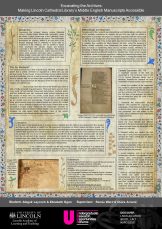By Abigail Laycock & Elizabeth Egan //

 Lincoln Cathedral Library is home to over two hundred and fifty medieval manuscripts – handwritten texts on parchment or paper, dating from the tenth century to the sixteenth. A well-known example is the Lincoln Thornton Manuscript due to its rarity: it is one of just two collections of romances, medicinal recipes and religious texts compiled by amateur scribe and Yorkshire landowner Robert Thornton. Some of the texts inside, such as the Alliterative Morte Arthure, are the only copies in the world.
Lincoln Cathedral Library is home to over two hundred and fifty medieval manuscripts – handwritten texts on parchment or paper, dating from the tenth century to the sixteenth. A well-known example is the Lincoln Thornton Manuscript due to its rarity: it is one of just two collections of romances, medicinal recipes and religious texts compiled by amateur scribe and Yorkshire landowner Robert Thornton. Some of the texts inside, such as the Alliterative Morte Arthure, are the only copies in the world.
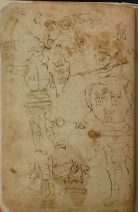
The aim of our project was to digitise a selection of the Cathedral Library’s Middle English manuscripts, bringing awareness of their importance and uniqueness to the public. The end product, therefore, is a series of open-access, online descriptions of the manuscripts which will be available on the Special Collections LibGuide and linked from the Cathedral Library website. To achieve this, we first went through the Thomson Catalogue which lists the entire collection and identified those in Middle English. We then selected six samples we felt would be of particular interest to the public. Our selection process included visits to the archive in Exchequer Gate to examine the manuscripts.
MS 91 f.52v used with the permission of the Dean and Chapter of Lincoln Cathedral
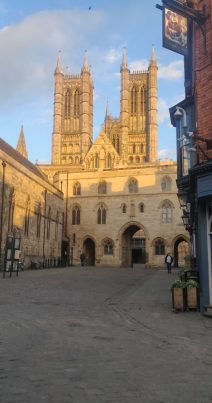 The bulk of our research was conducted with digital and print resources available in the University Library, the Cathedral Library, and the British Library. It was often difficult to find in-depth information about our chosen texts due to their rarity; Elizabeth found little existing research about the Alliterative Morte Arthure, and Abigail struggled to find information about John Lydgate’s minor poems despite the fame Lydgate once had. To overcome this, we studied the manuscripts themselves in great detail and formed our own discussion about them which will contribute towards future research.
The bulk of our research was conducted with digital and print resources available in the University Library, the Cathedral Library, and the British Library. It was often difficult to find in-depth information about our chosen texts due to their rarity; Elizabeth found little existing research about the Alliterative Morte Arthure, and Abigail struggled to find information about John Lydgate’s minor poems despite the fame Lydgate once had. To overcome this, we studied the manuscripts themselves in great detail and formed our own discussion about them which will contribute towards future research.
Exchequer Gate taken by Elizabeth Egan
Next, we compiled our research and wrote accessible summaries of our manuscripts, texts, and their contexts, making sure to define terms unfamiliar to a general reader. We considered what the public would find most interesting in terms of the manuscripts’ physical appearance and contents; our decision was that the extravagant illuminations decorated in blue, red and even gold ink would be eye-catching, whilst Arthurian romances and witty verse would draw readers in.
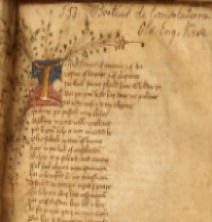 Working with our supervisors Renée and Claire has been integral to our success. Whilst Renée taught us how to recognise different handwriting styles known as ‘hands’ and later gave us an insight into poster design, Claire obtained our access to the manuscripts and photographed them. With Claire’s help we gained a true understanding of how to handle centuries-old items and were able to include images for the public to admire. We engaged in weekly online meetings to discuss our progress and next steps. Each student researcher was given the same workload as the other, and we frequently collaborated on research and writing for the Thornton and Chaucer manuscripts, poster, blog report and presentation. MS 103 f.3r used with the permission of the Dean and Chapter of Lincoln Cathedral
Working with our supervisors Renée and Claire has been integral to our success. Whilst Renée taught us how to recognise different handwriting styles known as ‘hands’ and later gave us an insight into poster design, Claire obtained our access to the manuscripts and photographed them. With Claire’s help we gained a true understanding of how to handle centuries-old items and were able to include images for the public to admire. We engaged in weekly online meetings to discuss our progress and next steps. Each student researcher was given the same workload as the other, and we frequently collaborated on research and writing for the Thornton and Chaucer manuscripts, poster, blog report and presentation. MS 103 f.3r used with the permission of the Dean and Chapter of Lincoln Cathedral
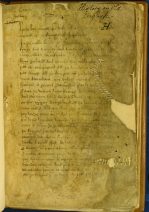 Whilst we were acquainted with Middle English Literature before undertaking this project, we knew very little about the world of manuscripts and cataloguing them. Throughout our study, we discovered what makes a manuscript, what handwriting styles are found in a manuscript, what history may lie within and how to handle them. Our newfound knowledge is made more important by its connection to Lincoln where we and the manuscripts reside.
Whilst we were acquainted with Middle English Literature before undertaking this project, we knew very little about the world of manuscripts and cataloguing them. Throughout our study, we discovered what makes a manuscript, what handwriting styles are found in a manuscript, what history may lie within and how to handle them. Our newfound knowledge is made more important by its connection to Lincoln where we and the manuscripts reside.
MS 70 f.1r used with the permission of the Dean and Chapter of Lincoln Cathedral
Our project has allowed us to be proactive researchers, contributing to the local and university community by sharing the knowledge we gained and making it accessible to all members of the public. Our studies and careers as English students will also benefit from this level of research, specifically as Elizabeth’s dissertation on the formation of English political and social identities will use our discoveries and Abigail’s future writing of historical fiction will draw upon the research skills she has developed.
*To view Elizabeth & Abigail ‘s research poster and presentation recording, please click on the thumbnails below:
